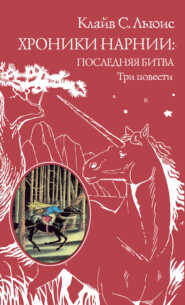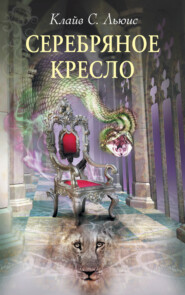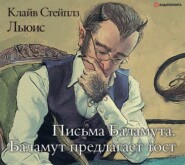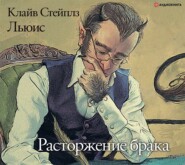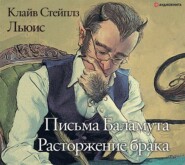По всем вопросам обращайтесь на: info@litportal.ru
(©) 2003-2024.
✖
The Weight of Glory: A Collection of Lewis’ Most Moving Addresses
Настройки чтения
Размер шрифта
Высота строк
Поля
The Weight of Glory: A Collection of Lewis’ Most Moving Addresses
C. S. Lewis
Selected from sermons delivered by C. S. Lewis during World War II, these nine addresses show the beloved author and theologian bringing hope and courage in a time of great doubt.Addressing some of the most difficult issues we face in our day-to-day lives, C.S. Lewis’s ardent and timeless words provide an unparalleled path to greater spiritual understanding.Considered by many to be Lewis’s finest sermon of all, and his most moving address, ‘The Weight of Glory’ extols a compassionate vision of Christianity an dincludes lucid and compelling discussions on faith.Also included in this volume are "Transposition," "On Forgiveness," "Why I Am Not a Pacifist," and "Learning in War-Time".
CONTENTS
Cover (#u0adf0deb-1FFF-11e9-9e03-0cc47a520474)
Title Page (#u0adf0deb-2FFF-11e9-9e03-0cc47a520474)
Introduction by Walter Hooper (#)
Preface to the Original Edition by the Author (#)
The Weight of Glory (#)
Learning in War-Time (#)
Why I Am Not a Pacifist (#)
Transposition (#)
Is Theology Poetry? (#)
The Inner Ring (#)
Membership (#)
On Forgiveness (#)
A Slip of the Tongue (#)
About the Author
Also by C. S. Lewis (#)
Copyright (#)
About the Publisher (#)
INTRODUCTION (#)
In his beautiful peroration at the end of his sermon “The Weight of Glory”, C. S. Lewis, after commenting on the immortality of the human soul, says, “This does not mean that we are to be perpetually solemn. We must play. But our merriment must be of that kind (and it is, in fact, the merriest kind) which exists between people who have, from the outset, taken each other seriously.”
I believe that this and similar encouragements by Lewis contribute significantly to the subject of what constitutes Christian behaviour. Having done the best we can to perform whatever God demands, should we not at least enjoy the good He sends us? Willing ourselves to be “perpetually solemn” when there is no reason for it seems to me not only a rejection of the happiness we could have on earth, but also to jeopardise our capacity to enjoy it in the future when every possible reason for unhappiness has been finally swept away.
We know from his earliest writings that Lewis was born with a sense of fun, and that it was considerably maimed by an entanglement of atheism and ambition. Perhaps a fiercely serious ambition for whatever it might be can never live in harmony with the merriment he describes. Certainly, Lewis could write no great works until he was converted to Christianity in 1931, after which he ceased to take much interest in himself. If it is objected by those of a lugubrious disposition that the Christian religion is serious and of great solemnity, then my answer is, “Yes, of course. And not taken seriously enough.” But Lewis comes to our rescue at this point by showing us in his book The Four Loves how easily things can become other than they should be through the wrong kind of seriousness.
In editing these essays I have been led to reflect on that ever mysterious, but instinctive notion we seem to be born with that tells us just how merry, how serious, how whatever you will, we know we can be with someone else. My relation to Lewis may be similar to that of others, but it can’t be exactly like. As this book is being edited primarily for Americans, I should explain that after I had corresponded with Lewis for some years, he invited me to come over in the spring of 1963 from my native United States for what I hoped would be as much as a single conversation over a cup of tea. I don’t believe in luck, but I do believe in angels, and the coveted tea party turned out to be (if it needs a name) “The Observations of a Late Arrival” or “A Single Summer with C.S.L.” In any event, as the sources of our firsthand evidence about him decrease with the years, I hope that mine will be of some interest to those who feel as I do about that merriment “of the merriest kind” of which there seems no abundance these days.
It took some time for an American, such as myself, to adapt to English “conveniences”. I see, for instance, from my diary of 7 June 1963 that during a longish visit with Lewis we drank what seemed gallons of tea. After a while I asked to be shown the “bathroom”, forgetting that in most homes the bathroom and the toilet are separate rooms. With a kind of mock formality, Lewis showed me to the bathroom, pointed to the tub, flung down a pile of towels, and closed the door behind me. I returned to his sitting-room to say that it was not a bath I wanted but … “Well, sir, ‘choose you this day,’” said Lewis, bursting with laughter as he quoted the prophet Joshua, “that will break you of those silly American euphemisms. And now, where is it you wanted to go?”
I see from other entries I made that Lewis—or “Jack” as he preferred to be called by his friends—and I were meeting at least three or four times a week, sometimes at his house, at other times in a pub with a group of friends called “The Inklings”. I knew that he was ill, indeed, that he had been so since 1961 when the troubles with his health began. He, however, seemed to think little of it and, as he looked so robust, it was easy to forget it when in company with this ruddy, six-foot, genial man. Hence the surprise of finding him not well enough to attend Mass with me on July 14. He urged me to remain there with him, and this was a memorable day for me in more ways than one. It was then that he asked me to accept immediately a post as his literary assistant and personal secretary, and later, after resigning my teaching position at the University of Kentucky, to return to Oxford to resume my duties.
Lewis went for a routine examination the next morning to the Acland Nursing Home, and, much to everyone’s surprise, he sank into a coma, lasting about twenty-four hours, from which the doctors did not believe he would recover. Our mutual friends, the Reverend Dr. Austin Farrer and his wife, were to be on holiday in Wales from the sixteenth through the thirty-first of July, but at Lewis’s request they remained in Oxford until the seventeenth, so that Austin Farrer could hear his confession and give him the Blessed Sacrament. Lewis wanted me to receive the Sacrament with him, but as I was not ill, this was not allowed. “In that case,” Lewis said, “you must be present to do the kneeling for me.” With so much to do for him at this time I was unable to keep a regular diary. However, I see from a letter I wrote to the Farrers on July 30 from Lewis’s home, and now part of the Farrer Papers in the Bodleian Library, Oxford, that I had already moved into Lewis’s home by that time.
Rather than tell Lewis how close he had come to dying, the doctors appeared to leave this to me. When I judged the time to be right, I told him about the coma and the few days when his mind was disordered. Thereafter Lewis continued to believe that the Extreme Unction administered during the coma and his reception of the Blessed Sacrament had saved his life.
Even before he went into the nursing home I marvelled that Lewis had lived so long without setting himself ablaze. Except when he dressed for a special occasion, he wore an old tweed jacket, the right-hand pocket of which had been patched and re-patched many times. This was because Lewis, when wearied of his pipe, would drop it into his pocket, with the result that it would burn its way through. And this happened so often that there was none of the original material left.
The nurses in the Acland, having found him nodding with a cigarette in his hand, would have none of this. And so it was that, except when I was with him, they would not allow him to have any matches. What puzzled Lewis was that after I had left him with a box of matches, a nurse would, as soon as I left, rush in and take them away. “How do they know?” he asked me one morning. “Give me a box I can hide under my bedclothes.” I had then to confess that while I was the supplier, I was also the informer. “Informer!” roared Lewis. “I have what no friend ever had before. I have a private traitor, my very own personal Benedict Arnold. Repent before it is too late!”
I loved all the rough and tumble of this, and I fancy I pulled his leg about as often as he pulled mine. But there was the gentler side that was just as typical. There was one incident that took place in the Acland which the readers of his Narnian stories might find as endearing as I did. It occurred on one of those days when Lewis’s mind was disordered and when, as I noticed, he could not recognise any of those who dropped in to see him—not even Professor Tolkien. The last visitor of the day was his foster-sister, Maureen Moore Blake, who a few months previously, and by a very unexpected turn of events, had become Lady Dunbar of Hempriggs, with a castle and a vast estate in Scotland. She was the first woman in three centuries to succeed to a baronetcy. They had not met since this happened and, hoping to spare her any disappointment, I told her that he had not been able to recognise any of his old friends. He opened his eyes when she took his hand. “Jack,” she whispered, “it is Maureen.” “No,” replied Lewis smiling, “it is Lady Dunbar of Hempriggs.” “Oh, Jack, how could you remember that?” she asked. “On the contrary,” he said. “How could I forget a fairy tale?”
One day when he was obviously much better, but not completely out of danger, he asked why I looked so glum.
The reason for the glumness was that, living in our neighbourhood was a fierce old atheist of about ninety-seven who went out for a brisk walk every day. Whenever we met he asked if Lewis was “still alive”, and on receiving my reply that he was indeed quite ill, he invariably said, “Nothing wrong with me! I’ve got a long time yet!”
I told Lewis that I was tempted—very strongly tempted—to tell Our Lord that I thought it monstrously unfair that He should allow the naughty old atheist to seemingly go on forever and yet let Lewis, who was only sixty-four, come so close to the point of death. “Mind you,” I said, observing Lewis’s face cloud over, “I haven’t actually said it in my prayers, but I’ve come pretty close.”
“And what do you think Our Lord would say to that?” Lewis said with a discouraging look.
“What?”
“What is that to you!”
Anyone who has read St. John 21:22—Our Lord’s rebuke to St. Peter—will recognise Lewis’s application of it in this instance. And then tenderly, tenderly, Lewis comforted me in what I had imagined was his sorrow, but which he knew was mine.
The worst over, there was a return of the high spirits and uproarious sense of fun that I found one of the most attractive things about Lewis. But it would take someone of Boswell’s talents to give the right idea to the completeness of this remarkable man, to show how naturally the humour blended into the more serious side, and indeed was one of the causes of his greatness of heart, his large intellect, and the most open charity I have ever found in anyone. He was a man, many of us have come to see, of common instincts combined with very uncommon abilities. Perhaps it is worth recording that I knew—I just knew—that no matter how long I lived, no matter who else I met, I should never be in the company of such a supremely good human being again. Of all my memories this is the most indelible and is certain to remain so.
I brought Lewis home on 6 August, along with a male nurse, a Scotsman named Alec Ross, whose responsibility it was to stay awake nights should he be needed. Lewis and I had been together almost continuously for two months, and I was even more comfortable with him now that we were in the same house. He had not once complained about conditions in the Acland—excepting, of course, my “traitorous” behaviour over the appearing and disappearing matches. Certainly he snuggled back into his familiar surroundings with much pleasure. Sensing that he liked being left alone a little while after lunch, I asked if he ever took a nap. “Oh, no!” he replied. “But, mind you, sometime a nap takes me.”
He had kept up his dictating of letters during his stay in the Acland. And although he was able to do more of this at home, he gave as well more attention to the problems which, since 1961, he knew could become worse should he die suddenly: his brother’s unfortunate problem with alcohol, and the future of his two stepsons who had, besides losing their mother in 1960, seen other sadnesses as well. But I mention these things because it was then I observed something I had never seen in anyone else (excepting, as I was to learn later, his friend Owen Barfield). Lewis had his share—some would say more than his share—of worries. But, having done all in his power to solve them, he left the matter to God and got on with his work and pleasures. Those who go on to read, for example, the additions to his sermon “Transposition” (of which more later) will perhaps understand what may sound like sweet banality but isn’t—that Lewis really wanted and liked the happiness which the Divine Son died to give all men. And this I observed at the time, some ten years before I saw in the Bodleian the whole thing put so succinctly in a letter to his brother of 28 January 1940 in which he says, “I begin to suspect that the world is divided not only into the happy and the unhappy, but into those who like happiness and those who, odd as it seems, really don’t.” Without meaning any offence, I suspect that those who carry on about “social consciousness” or whatever the current jargon is would not understand this. Still, that is the way it was.
Our nurse hardly knew what to make of Lewis. Alec was not a learned man, but he was fortunate in being one of the few male nurses at that time. And for this reason he had been able to pick and choose his patients, nearly always with an eye as to whether they were fabulously rich, famous for something or the other, and (he hoped) possessed of a Rolls Royce. He was a good nurse but he had a foul tongue. At his first sight of the kitchen he pronounced the house to be a “pig sty” and very quickly had the servants sweeping, mopping, and disinfecting as fast as it could be done.
But there remained for him the mystifying contradiction of a far from attractive house presided over by a “somebody”. We were taking our tea alone one day when he asked whether—he couldn’t think of the name Who’s Who—the “great mon was in that big boke …” Lewis was coming through the door and, overhearing this, said, “Ay, ay, Alec. I am in what you in Scotland would call Wha’s Wha.” That did it. Alec was thereafter devoted to Lewis for his humour and self-forgetfulness, it now making no difference whether Lewis was famous for anything Alec thought important.
In August Lewis dictated a letter announcing his retirement from Cambridge. Then, at the end of the month, with Alec left to keep an eye on Lewis, his stepson Douglas Gresham and I were sent to Cambridge to sort out his affairs and bring home many of the two thousand or so books from his Magdalene College rooms. This done, we hired a lorry to transport us and the books to Oxford. All the way home I wondered where the books could go in a house already filled to the bursting point. But Lewis had laid his plans.
Alec occupied what was called the “music room”—a large room on the ground floor, empty except for a bed in one corner. Having been up all night, Alec was asleep when we arrived. As the lorry pulled into the drive, there was Lewis cautioning us to be quiet. “Where’ll we store the books?” I whispered. Lewis answered with a wink. With infinite pains so as not to waken Alec, we spent an hour or so carrying the books into the “music room” and stacking them around the nurse’s bed. He was still snoring when the last one was added to the great wall of books, which was nearly as high as the ceiling and which filled nearly every square inch of the room.
About the time the nurse usually woke, Lewis and I were waiting outside for the results. Then it happened. Alec woke, found himself entombed in books, and bellowed at the top of his voice. Suddenly part of the great wall of books tumbled down, and a body scrambled out. Over drinks Alec pronounced it to be the best d—d joke he had seen played on anyone.
If I have said less than some would wish about Lewis’s specifically “religious” position, that is because I assume that it is already quite clear. Rather, I have tried to indicate from personal recollections that Dr. Johnson might well have had such a man as C. S. Lewis in mind in suggesting that “the size of a man’s understanding might always be justly measured by his mirth”. If I have failed, then the splendid pieces that comprise this collection ought, as they say, “to make up for everything”.
Lewis was a truly modest man. If his books came naturally into our conversation, he would talk about them with the same detachment as in discussing some stranger’s works. But he had no interest as far as I could see in his literary or theological position in the world. One evening this came up rather naturally.
We had been talking about one of our favourite books, Malory’s Morte d’Arthur, and I mentioned how disappointed I sometimes felt when, say, Sir Launcelot went out to deliver a helpless lady from some peril or other. Then, just at that point where you can’t admire him enough for his selflessness, he explains to someone, as though it was the most natural thing in the world, that he is doing it to “win worship”—that is, to increase his reputation. We recognised it as an inheritance from Paganism. Without intending any embarrassment, I asked Lewis if he was ever aware of the fact that regardless of his intentions he was “winning worship” from his books. He said in a low, still voice, and with the deepest and most complete humility I’ve ever observed in anyone, “One cannot be too careful not to think of it.” The house, the garden, the whole universe seemed hushed for a moment, and then we began talking again.
C. S. Lewis
Selected from sermons delivered by C. S. Lewis during World War II, these nine addresses show the beloved author and theologian bringing hope and courage in a time of great doubt.Addressing some of the most difficult issues we face in our day-to-day lives, C.S. Lewis’s ardent and timeless words provide an unparalleled path to greater spiritual understanding.Considered by many to be Lewis’s finest sermon of all, and his most moving address, ‘The Weight of Glory’ extols a compassionate vision of Christianity an dincludes lucid and compelling discussions on faith.Also included in this volume are "Transposition," "On Forgiveness," "Why I Am Not a Pacifist," and "Learning in War-Time".
CONTENTS
Cover (#u0adf0deb-1FFF-11e9-9e03-0cc47a520474)
Title Page (#u0adf0deb-2FFF-11e9-9e03-0cc47a520474)
Introduction by Walter Hooper (#)
Preface to the Original Edition by the Author (#)
The Weight of Glory (#)
Learning in War-Time (#)
Why I Am Not a Pacifist (#)
Transposition (#)
Is Theology Poetry? (#)
The Inner Ring (#)
Membership (#)
On Forgiveness (#)
A Slip of the Tongue (#)
About the Author
Also by C. S. Lewis (#)
Copyright (#)
About the Publisher (#)
INTRODUCTION (#)
In his beautiful peroration at the end of his sermon “The Weight of Glory”, C. S. Lewis, after commenting on the immortality of the human soul, says, “This does not mean that we are to be perpetually solemn. We must play. But our merriment must be of that kind (and it is, in fact, the merriest kind) which exists between people who have, from the outset, taken each other seriously.”
I believe that this and similar encouragements by Lewis contribute significantly to the subject of what constitutes Christian behaviour. Having done the best we can to perform whatever God demands, should we not at least enjoy the good He sends us? Willing ourselves to be “perpetually solemn” when there is no reason for it seems to me not only a rejection of the happiness we could have on earth, but also to jeopardise our capacity to enjoy it in the future when every possible reason for unhappiness has been finally swept away.
We know from his earliest writings that Lewis was born with a sense of fun, and that it was considerably maimed by an entanglement of atheism and ambition. Perhaps a fiercely serious ambition for whatever it might be can never live in harmony with the merriment he describes. Certainly, Lewis could write no great works until he was converted to Christianity in 1931, after which he ceased to take much interest in himself. If it is objected by those of a lugubrious disposition that the Christian religion is serious and of great solemnity, then my answer is, “Yes, of course. And not taken seriously enough.” But Lewis comes to our rescue at this point by showing us in his book The Four Loves how easily things can become other than they should be through the wrong kind of seriousness.
In editing these essays I have been led to reflect on that ever mysterious, but instinctive notion we seem to be born with that tells us just how merry, how serious, how whatever you will, we know we can be with someone else. My relation to Lewis may be similar to that of others, but it can’t be exactly like. As this book is being edited primarily for Americans, I should explain that after I had corresponded with Lewis for some years, he invited me to come over in the spring of 1963 from my native United States for what I hoped would be as much as a single conversation over a cup of tea. I don’t believe in luck, but I do believe in angels, and the coveted tea party turned out to be (if it needs a name) “The Observations of a Late Arrival” or “A Single Summer with C.S.L.” In any event, as the sources of our firsthand evidence about him decrease with the years, I hope that mine will be of some interest to those who feel as I do about that merriment “of the merriest kind” of which there seems no abundance these days.
It took some time for an American, such as myself, to adapt to English “conveniences”. I see, for instance, from my diary of 7 June 1963 that during a longish visit with Lewis we drank what seemed gallons of tea. After a while I asked to be shown the “bathroom”, forgetting that in most homes the bathroom and the toilet are separate rooms. With a kind of mock formality, Lewis showed me to the bathroom, pointed to the tub, flung down a pile of towels, and closed the door behind me. I returned to his sitting-room to say that it was not a bath I wanted but … “Well, sir, ‘choose you this day,’” said Lewis, bursting with laughter as he quoted the prophet Joshua, “that will break you of those silly American euphemisms. And now, where is it you wanted to go?”
I see from other entries I made that Lewis—or “Jack” as he preferred to be called by his friends—and I were meeting at least three or four times a week, sometimes at his house, at other times in a pub with a group of friends called “The Inklings”. I knew that he was ill, indeed, that he had been so since 1961 when the troubles with his health began. He, however, seemed to think little of it and, as he looked so robust, it was easy to forget it when in company with this ruddy, six-foot, genial man. Hence the surprise of finding him not well enough to attend Mass with me on July 14. He urged me to remain there with him, and this was a memorable day for me in more ways than one. It was then that he asked me to accept immediately a post as his literary assistant and personal secretary, and later, after resigning my teaching position at the University of Kentucky, to return to Oxford to resume my duties.
Lewis went for a routine examination the next morning to the Acland Nursing Home, and, much to everyone’s surprise, he sank into a coma, lasting about twenty-four hours, from which the doctors did not believe he would recover. Our mutual friends, the Reverend Dr. Austin Farrer and his wife, were to be on holiday in Wales from the sixteenth through the thirty-first of July, but at Lewis’s request they remained in Oxford until the seventeenth, so that Austin Farrer could hear his confession and give him the Blessed Sacrament. Lewis wanted me to receive the Sacrament with him, but as I was not ill, this was not allowed. “In that case,” Lewis said, “you must be present to do the kneeling for me.” With so much to do for him at this time I was unable to keep a regular diary. However, I see from a letter I wrote to the Farrers on July 30 from Lewis’s home, and now part of the Farrer Papers in the Bodleian Library, Oxford, that I had already moved into Lewis’s home by that time.
Rather than tell Lewis how close he had come to dying, the doctors appeared to leave this to me. When I judged the time to be right, I told him about the coma and the few days when his mind was disordered. Thereafter Lewis continued to believe that the Extreme Unction administered during the coma and his reception of the Blessed Sacrament had saved his life.
Even before he went into the nursing home I marvelled that Lewis had lived so long without setting himself ablaze. Except when he dressed for a special occasion, he wore an old tweed jacket, the right-hand pocket of which had been patched and re-patched many times. This was because Lewis, when wearied of his pipe, would drop it into his pocket, with the result that it would burn its way through. And this happened so often that there was none of the original material left.
The nurses in the Acland, having found him nodding with a cigarette in his hand, would have none of this. And so it was that, except when I was with him, they would not allow him to have any matches. What puzzled Lewis was that after I had left him with a box of matches, a nurse would, as soon as I left, rush in and take them away. “How do they know?” he asked me one morning. “Give me a box I can hide under my bedclothes.” I had then to confess that while I was the supplier, I was also the informer. “Informer!” roared Lewis. “I have what no friend ever had before. I have a private traitor, my very own personal Benedict Arnold. Repent before it is too late!”
I loved all the rough and tumble of this, and I fancy I pulled his leg about as often as he pulled mine. But there was the gentler side that was just as typical. There was one incident that took place in the Acland which the readers of his Narnian stories might find as endearing as I did. It occurred on one of those days when Lewis’s mind was disordered and when, as I noticed, he could not recognise any of those who dropped in to see him—not even Professor Tolkien. The last visitor of the day was his foster-sister, Maureen Moore Blake, who a few months previously, and by a very unexpected turn of events, had become Lady Dunbar of Hempriggs, with a castle and a vast estate in Scotland. She was the first woman in three centuries to succeed to a baronetcy. They had not met since this happened and, hoping to spare her any disappointment, I told her that he had not been able to recognise any of his old friends. He opened his eyes when she took his hand. “Jack,” she whispered, “it is Maureen.” “No,” replied Lewis smiling, “it is Lady Dunbar of Hempriggs.” “Oh, Jack, how could you remember that?” she asked. “On the contrary,” he said. “How could I forget a fairy tale?”
One day when he was obviously much better, but not completely out of danger, he asked why I looked so glum.
The reason for the glumness was that, living in our neighbourhood was a fierce old atheist of about ninety-seven who went out for a brisk walk every day. Whenever we met he asked if Lewis was “still alive”, and on receiving my reply that he was indeed quite ill, he invariably said, “Nothing wrong with me! I’ve got a long time yet!”
I told Lewis that I was tempted—very strongly tempted—to tell Our Lord that I thought it monstrously unfair that He should allow the naughty old atheist to seemingly go on forever and yet let Lewis, who was only sixty-four, come so close to the point of death. “Mind you,” I said, observing Lewis’s face cloud over, “I haven’t actually said it in my prayers, but I’ve come pretty close.”
“And what do you think Our Lord would say to that?” Lewis said with a discouraging look.
“What?”
“What is that to you!”
Anyone who has read St. John 21:22—Our Lord’s rebuke to St. Peter—will recognise Lewis’s application of it in this instance. And then tenderly, tenderly, Lewis comforted me in what I had imagined was his sorrow, but which he knew was mine.
The worst over, there was a return of the high spirits and uproarious sense of fun that I found one of the most attractive things about Lewis. But it would take someone of Boswell’s talents to give the right idea to the completeness of this remarkable man, to show how naturally the humour blended into the more serious side, and indeed was one of the causes of his greatness of heart, his large intellect, and the most open charity I have ever found in anyone. He was a man, many of us have come to see, of common instincts combined with very uncommon abilities. Perhaps it is worth recording that I knew—I just knew—that no matter how long I lived, no matter who else I met, I should never be in the company of such a supremely good human being again. Of all my memories this is the most indelible and is certain to remain so.
I brought Lewis home on 6 August, along with a male nurse, a Scotsman named Alec Ross, whose responsibility it was to stay awake nights should he be needed. Lewis and I had been together almost continuously for two months, and I was even more comfortable with him now that we were in the same house. He had not once complained about conditions in the Acland—excepting, of course, my “traitorous” behaviour over the appearing and disappearing matches. Certainly he snuggled back into his familiar surroundings with much pleasure. Sensing that he liked being left alone a little while after lunch, I asked if he ever took a nap. “Oh, no!” he replied. “But, mind you, sometime a nap takes me.”
He had kept up his dictating of letters during his stay in the Acland. And although he was able to do more of this at home, he gave as well more attention to the problems which, since 1961, he knew could become worse should he die suddenly: his brother’s unfortunate problem with alcohol, and the future of his two stepsons who had, besides losing their mother in 1960, seen other sadnesses as well. But I mention these things because it was then I observed something I had never seen in anyone else (excepting, as I was to learn later, his friend Owen Barfield). Lewis had his share—some would say more than his share—of worries. But, having done all in his power to solve them, he left the matter to God and got on with his work and pleasures. Those who go on to read, for example, the additions to his sermon “Transposition” (of which more later) will perhaps understand what may sound like sweet banality but isn’t—that Lewis really wanted and liked the happiness which the Divine Son died to give all men. And this I observed at the time, some ten years before I saw in the Bodleian the whole thing put so succinctly in a letter to his brother of 28 January 1940 in which he says, “I begin to suspect that the world is divided not only into the happy and the unhappy, but into those who like happiness and those who, odd as it seems, really don’t.” Without meaning any offence, I suspect that those who carry on about “social consciousness” or whatever the current jargon is would not understand this. Still, that is the way it was.
Our nurse hardly knew what to make of Lewis. Alec was not a learned man, but he was fortunate in being one of the few male nurses at that time. And for this reason he had been able to pick and choose his patients, nearly always with an eye as to whether they were fabulously rich, famous for something or the other, and (he hoped) possessed of a Rolls Royce. He was a good nurse but he had a foul tongue. At his first sight of the kitchen he pronounced the house to be a “pig sty” and very quickly had the servants sweeping, mopping, and disinfecting as fast as it could be done.
But there remained for him the mystifying contradiction of a far from attractive house presided over by a “somebody”. We were taking our tea alone one day when he asked whether—he couldn’t think of the name Who’s Who—the “great mon was in that big boke …” Lewis was coming through the door and, overhearing this, said, “Ay, ay, Alec. I am in what you in Scotland would call Wha’s Wha.” That did it. Alec was thereafter devoted to Lewis for his humour and self-forgetfulness, it now making no difference whether Lewis was famous for anything Alec thought important.
In August Lewis dictated a letter announcing his retirement from Cambridge. Then, at the end of the month, with Alec left to keep an eye on Lewis, his stepson Douglas Gresham and I were sent to Cambridge to sort out his affairs and bring home many of the two thousand or so books from his Magdalene College rooms. This done, we hired a lorry to transport us and the books to Oxford. All the way home I wondered where the books could go in a house already filled to the bursting point. But Lewis had laid his plans.
Alec occupied what was called the “music room”—a large room on the ground floor, empty except for a bed in one corner. Having been up all night, Alec was asleep when we arrived. As the lorry pulled into the drive, there was Lewis cautioning us to be quiet. “Where’ll we store the books?” I whispered. Lewis answered with a wink. With infinite pains so as not to waken Alec, we spent an hour or so carrying the books into the “music room” and stacking them around the nurse’s bed. He was still snoring when the last one was added to the great wall of books, which was nearly as high as the ceiling and which filled nearly every square inch of the room.
About the time the nurse usually woke, Lewis and I were waiting outside for the results. Then it happened. Alec woke, found himself entombed in books, and bellowed at the top of his voice. Suddenly part of the great wall of books tumbled down, and a body scrambled out. Over drinks Alec pronounced it to be the best d—d joke he had seen played on anyone.
If I have said less than some would wish about Lewis’s specifically “religious” position, that is because I assume that it is already quite clear. Rather, I have tried to indicate from personal recollections that Dr. Johnson might well have had such a man as C. S. Lewis in mind in suggesting that “the size of a man’s understanding might always be justly measured by his mirth”. If I have failed, then the splendid pieces that comprise this collection ought, as they say, “to make up for everything”.
Lewis was a truly modest man. If his books came naturally into our conversation, he would talk about them with the same detachment as in discussing some stranger’s works. But he had no interest as far as I could see in his literary or theological position in the world. One evening this came up rather naturally.
We had been talking about one of our favourite books, Malory’s Morte d’Arthur, and I mentioned how disappointed I sometimes felt when, say, Sir Launcelot went out to deliver a helpless lady from some peril or other. Then, just at that point where you can’t admire him enough for his selflessness, he explains to someone, as though it was the most natural thing in the world, that he is doing it to “win worship”—that is, to increase his reputation. We recognised it as an inheritance from Paganism. Without intending any embarrassment, I asked Lewis if he was ever aware of the fact that regardless of his intentions he was “winning worship” from his books. He said in a low, still voice, and with the deepest and most complete humility I’ve ever observed in anyone, “One cannot be too careful not to think of it.” The house, the garden, the whole universe seemed hushed for a moment, and then we began talking again.








